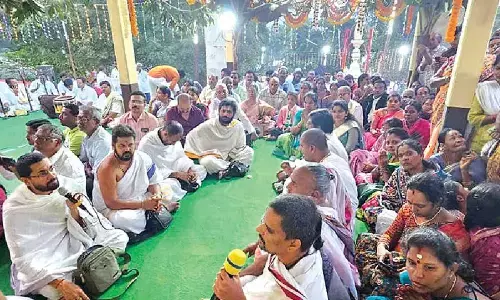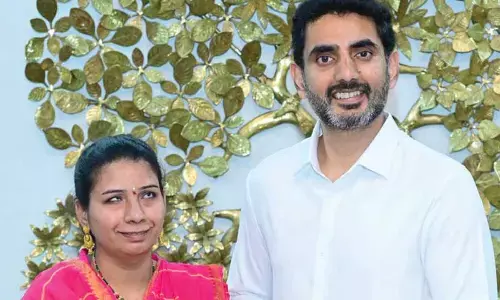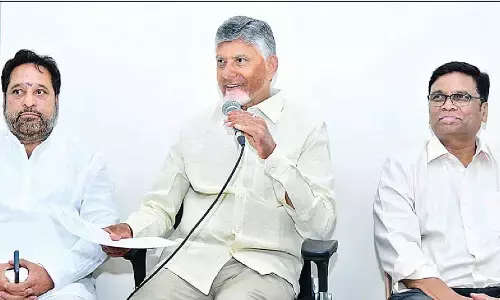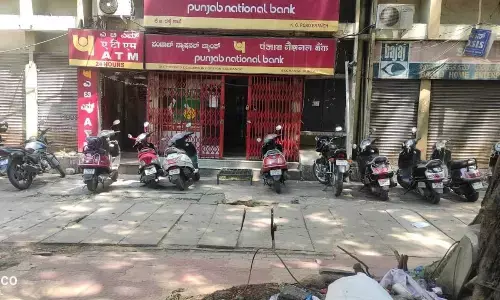Moving away from rote learning

Gone are the days when classrooms comprised of just a teacher, students and a blackboard. Today, many schools in the city have begun adopting technologically-advanced features such as smart classes to engage bright young minds. Technology in classrooms is not just about displaying expensive tools but utilising them in a way to help children learn better.
Gone are the days when classrooms comprised of just a teacher, students and a blackboard. Today, many schools in the city have begun adopting technologically-advanced features such as smart classes to engage bright young minds. Technology in classrooms is not just about displaying expensive tools but utilising them in a way to help children learn better.
Jyothi Kuturi, a teacher from Jain Public School, feels that easy and effective learning will help students perform better. “E-learning is catching up; today we use tools which make lessons interactive rather than one-way communication exercises. Our present education system focuses more on rote-based learning. In an attempt to fight this handicap, we have introduced new methods.
We involve children in sessions that are more practical and that don’t involve teachers giving notes. Learning should be made fun and interesting,” avers Jyothi. Maria David, a teacher from St. Mary’s School said, "Technology is changing the core areas of education. Today most children know their way around gadgets like tabs and laptops.
They are tech-savvy and we also have to adapt ourselves. Innovative teaching and learning through technology are steps towards value-based education. Earlier, projectors were used at college level. Now, even schools have done away with the traditional blackboards and have turned to them. They save time and help us complete the syllabus in time and use the remaining classes for revision.”
Technology has also helped average and below average students to improve. Prabhu Mathew, one of the directors of Chaitanya School, said, “In most of the schools, students are taught concepts but they don’t get to explore them. Students should explore and challenge these concepts. Children should be encouraged to verify what is taught. Students who learn concepts practically can understand and apply them better.”
Effective exchange programmes
Schools are also taking education to the next level with several programmes and workshops. “Our students are sent to schools in other states through exchange programmes. Last year, we sent our Class IX students to Bishop Cotton School in Shimla, where they attended daily classes for a week and later brought back feedback on different teaching methods practiced in these schools. We adapt accordingly if we find them interesting and beneficial.
Also, once in every three months, our school invites speakers from different parts of the world to address students. Workshops on a variety of subjects are also conducted once a month. We also send students on field trips, where they get hands-on experience on what’s taught in the class,” said Revathi Sebastian, a teacher at St. Andrew’s School.
Schools in the city are veering towards real-time learning and are adopting newer ways to provide education, where children are given e-devices to make learning easy and fun. Deepa, Vice-Principal of St. Andrew’s School, highlighted that the school intends to inculcate the culture of prompting questions and helping students find answers on their own.
“It nurtures the ‘scientist’ within and encourages them to verify textual knowledge. Technology should be used to cater different kinds of learners to deal with different learning speeds in a way that will allow the child to perform better,” explained Deepa.
The focus here also switches to teachers. They should be abreast of the technology provided as schools tend to spend a lot of money on technology-based education. During summer vacation, teachers are assessed and evaluated through different programmes, which in turn train them to use these tools.
The aim of these programmes is to see what innovative practices the teachers are employing and how it’s adding to the outcome of a student’s performance. Deepa added that the programme was meant to ensure all teachers provided quality education using these devices and were sound in their fundamental knowledge of the subject, which is a shift from the regular blackboard teaching.
By: Navatha Y

















